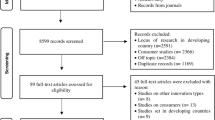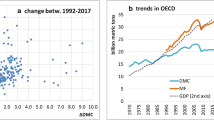Abstract
It has long been recognized that indigenous research should be helpful, if not essential, for an adequate understanding of local phenomena. The indigenous approach is consistent with, but extends beyond, the repeated calls for contextualizing management and organization research. However, the challenges of indigenous research are enormous. The purpose of this article is to shed light on these challenges by providing an integrative framework of indigenous research. In particular, I seek to explicate the existing conceptual confusions and flesh out the appropriate methodological procedures for indigenous research on Chinese management. To illustrate the framework, I show the value of yin-yang thinking by developing a cognitive frame, Yin-Yang Balance, to illustrate the unique and novel features of local perspective, including its application to case study method.

Similar content being viewed by others
References
Au, K. 2007. Self-confidence does not come isolated from the environment. Asia Pacific Journal of Management, 24(4): 491–496.
Bandura, A. 1999. Social cognition theory: An agentic perspective. Asian Journal of Social Psychology, 2: 21–42.
Barney, J. B., & Zhang, S. 2009. The future of Chinese management research: A theory of Chinese management versus a Chinese theory of management. Management and Organization Review, 5: 15–28.
Bartlett, C. A., & Ghoshal, S. 1998. Managing across borders: The transnational solution. Boston: Harvard Business Press.
Charmaz, K. C. 2006. Constructive grounded theory: A practical guide through qualititative analysis. Thousand Oaks, CA: Sage.
Chen, J.-R., Leung, K., & Chen, C. C. 2009. Bringing national culture to the table: Making a difference with cross-cultural differences and perspectives. Academy of Management Annals, 3: 217–249.
Chen, M.-J. 2002. Transcending paradox: The Chinese “middle way” perspective. Asia Pacific Journal of Management, 19(2–3): 179–199.
Chen, M.-J. 2008. Reconceptualizing the competition-cooperation relationship: A transparadox perspective. Journal of Management Inquiry, 17: 288–304.
Cheng, B. S., Wang, A. C., & Huang, M. P. 2009. The road more popular versus the road less travelled: An “insider’s” perspective of advancing Chinese management research. Management and Organization Review, 5: 91–106.
da Costa, N. C. A., & Krause, D. 2006. The logic of complementarity. In J. van Benthem, G. Heinzmann, M. Rebuschi & H. Visser (Eds.). The age of alternative logics: Assessing Philosophy of Logic and Mathematics Today: 103–120. Springer.
Editor’s Forum on the Future of Chinese Management. 2009. Management and Organization Review, 5(1).
Eisenhardt, K. M. 1989. Building theories from case study research. Academy of Management Review, 14: 532–550.
Enriquez, V. G. 1990. Cross-indigenous methods and perspectives. In V. G. Enriquez (Ed.). Indigenous psychology: A book of readings: 210–230. Quezon City, PH: Philippine Psychology Research and Training House.
Fang, T. 2010. Asian management research needs more self-confidence: Reflection on Hofstede (2007) and beyond. Asia Pacific Journal of Management, 27(1): 155–170.
Farh, J. L., Cannella, A. A., & Lee, C. 2006. Approaches to scale development in Chinese management research. Management and Organization Review, 2: 301–318.
Farjoun, M. 2010. Beyond dualism: Stability and change as a duality. Academy of Management Review, 35: 202–225.
Glaser, B. G., & Strauss, A. L. 1967. The discovery of grounded theory: Strategies for qualitative research. Chicago: Aldine.
Graham, A. C. 1986. Yin-Yang and the nature of correlative thinking. Singapore: National University of Singapore Press.
Gu, M. D. 2005. The Zhouyi (Book of Changes) as an open classic: A semiotic analysis of its system of representation. Philosophy East and West, 55: 257–282.
Hwang, K.-K. 2006. Constructive realism and Confucian relationalism: An epistemological strategy for the development of indigenous psychology. In U. Kim, G.-S. Yang & K.-K. Hwang (Eds.). International and cultural psychology: Understanding people in context: 73–107. Springer.
Johns, G. 2006. The essential impact of context on organizational behavior. Academy of Management Review, 31: 386–408.
Kelso, J. A. S., & Engstrom, D. A. 2006. The complementary nature. Boston: MIT Press.
Kim, U., & Park, Y.-S. 2005. Integrated analysis of indigenous psychologies: Comments and extensions of ideas presented by Shams, Jackson, Hwang and Kashima. Asian Journal of Social Psychology, 8: 75–95.
Leung, K. 2007. The glory and tyranny of citation impact: An East Asian perspective. Academy of Management Journal, 50: 510–513.
Leung, K., Li, P. P., Chen, C. C., & Luo, J. 2009. Call for the special issue on indigenous research on Chinese management, Management and Organization Review, 4.
Li, P. P. 1998. Toward a geocentric framework of organizational form: A holistic, dynamic and paradoxical approach. Organization Studies, 19: 829–861.
Li, P. P. 2005. The puzzle of China’s township village enterprises: The paradox of local corporatism in a dual tack economic transition. Management and Organization Review, 1: 197–224.
Li, P. P. 2007. Social tie, social capital, and social behavior: Toward an integrated framework of organized exchange. Asia Pacific Journal of Management, 24(2): 227–246.
Li, P. P. 2008. Toward a geocentric framework of trust: An application to organizational trust. Management and Organization Review, 4: 413–439.
Li, P. P. 2010. Toward a learning-based view of internationalization: The accelerated trajectories of cross-border learning for latecomers. Journal of International Management, 16: 43–59.
Li, P. P. 2011. The rigor-relevance balance for engaged scholarship: New frame and new agenda for trust research and beyond. Journal of Trust Research, 1: 1–21.
Lin, N. 2002. How the East and West shall meet. Development and Society, 31: 211–244.
Lloyd, G. E. R. 1996. Adversaries and authorities: Investigations into ancient Greek and Chinese science. Cambridge: Cambridge University Press.
Lloyd, G. E. R. 2007. Cognitive variations: Reflections on the unity and diversity of the human mind. New York: Oxford University Press.
March, J. 2005. Parochialism in the evolution of a research community: The case of organization studies. Management and Organization Review, 1: 5–22.
Meyer, K. E. 2006. Asian management research needs more self-confidence. Asia Pacific Journal of Management, 23(2): 119–137.
Meyer, K. E. 2007. Asian contexts and the search for general theory in management research: A rejoinder. Asia Pacific Journal of Management, 24(4): 527–534.
Morris, M. W., Leung, K., Ames, D., & Lickel, B. 1999. Views from inside and outside: Integrating emic and etic insights about culture and justice judgment. Academy of Management Review, 24: 781–796.
Needham, J. 1956. Science and civilization in China (Vol. 2: History of scientific thought). Cambridge: Cambridge University Press.
Nisbett, R. 2003. The geography of thought: How Asians and Westerners think differently…and why. London: Nicholas Brealey Publishing.
Pellegrini, E. K., & Scandura, T. A. 2008. Paternalistic leadership: A review and agenda for future research. Journal of Management, 34: 566–593.
Peng, K., & Nisbett, R. 1999. Culture, dialectics, and reasoning about contradiction. The American Psychologist, 54: 741–754.
Pettigrew, A. 1990. Longitudinal field research on change: Theory and practice. Organizational Science, 1: 267–292.
Pfeffer, J. 1993. Barriers to the advance of organizational science: Paradigm development as a dependent variable. Academy of Management Review, 18: 599–620.
Polanyi, M. 1968. Logic and psychology. The American Psychologist, 23: 27–43.
Prahalad, C. K., & Doz, Y. L. 1987. The multinational mission. New York: Free Press.
Tsui, A. S. 2004. Contributing to global management knowledge: A case for high quality indigenous research. Asia Pacific Journal of Management, 21(4): 491–513.
Tsui, A. S. 2006. Contextualization in Chinese management research. Management and Organization Review, 2: 1–13.
Tsui, A. S. 2007. From homogenization to pluralism: International management research in the Academy and beyond. Academy of Management Journal, 50: 1353–1364.
Van Glinow, M. A., & Teagarden, M. B. 2009. The future of Chinese management research: Rigor and relevance redux. Management and Organization Review, 5: 75–89.
Whetten, D. A. 2009. An examination of the interface between context and theory applied to the study of Chinese organizations. Management and Organization Review, 5: 29–55.
White, S. 2002. Rigor and relevance in Asian management research: Where are we and where can we go? Asia Pacific Journal of Management, 19(2–3): 287–352.
Yang, K.-S. 2000. Monocultural and cross-cultural indigenous approaches: The royal road to the development of a balanced global psychology. Asian Journal of Social Psychology, 3: 241–263.
Yin, R. K. 2009. Case study research: Design and methods, 4th ed. Newbury Park, CA: Sage.
Zhang, W.-R., & Zhang, L. 2004. YinYang bipolar logic and bipolar fuzzy logic. Information Science, 165: 265–287.
Author information
Authors and Affiliations
Corresponding author
Additional information
Special thanks to James March, David Whetten, Kwok Leung, Anne Tsui, and Chao Chen as well as my colleagues at Copenhagen Business School, Verner Worm and Xin Li, for helpful comments on the earlier versions of this article. I also appreciate the strong support and valuable suggestions from David Ahlstrom and Klaus Meyer.
Rights and permissions
About this article
Cite this article
Li, P.P. Toward an integrative framework of indigenous research: The geocentric implications of Yin-Yang Balance. Asia Pac J Manag 29, 849–872 (2012). https://doi.org/10.1007/s10490-011-9250-z
Published:
Issue Date:
DOI: https://doi.org/10.1007/s10490-011-9250-z




